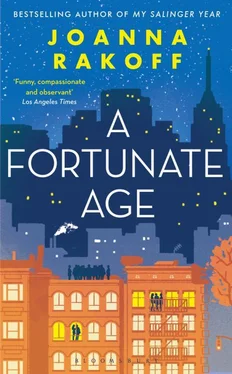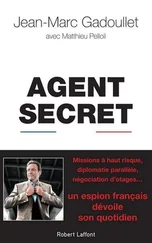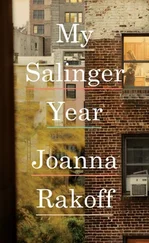“Not really.” Lil smiled. “You know they hate the holidays.” Lil’s parents both reviled Christmas and rejected Hanukkah, which they viewed as an invented holiday and “too much fuss.” Still, Lil and Tuck had planned to visit them in December—spending the twenty-fifth, as per one of the Roths’ few traditions, at the Golden Panda on Melrose—and then head to Atlanta, for a few days with Tuck’s mom, over New Year’s. But they’d waited to buy their tickets, which they thought they’d pay for with Tuck’s bonus, rumored to be handed out in cash on the twenty-third. But fate—or Tuck’s boss—had intervened three days before that date and there had been no bonus, which meant there had been no trip. And though her parents weren’t terribly upset, they were baffled that Lil canceled so late. “Are the tickets refundable?” her father asked. “Um, we don’t actually have tickets,” Lil told him. “How were you planning on getting here?” he asked gruffly. Her father would have made the arrangements back in September, perhaps cashing in some of his many frequent-flier miles. He would have planned the whole trip long before Thanksgiving, from car rentals to guidebooks to restaurants. This was part of it, Tuck’s inability to plan . He was, it seemed, incapable of thinking beyond the next five minutes. When he was hungry, he wanted to eat immediately. Or, as with his job, if he wanted to sleep, he simply slept. He was a child. And she’d thought him, when they met, so grown-up, so different from Dave and Tal and the other men she knew, who all seemed spindly and adolescent by comparison.
“I think I was more disappointed than they were,” she said, dropping an irregular lump of brown sugar into her coffee. It was true. Her parents, typically, seemed more annoyed at the inconvenience of her canceling than disappointed that they wouldn’t get to see their only child at the holidays. But then Lil hadn’t been particularly looking forward to seeing them, either. Her visits home always devolved into arguments—“What are you going to do with a Ph.D.? Work in a coffee shop?”—which ended with Lil slamming the door to her childhood room and hiding therein for hours, thumbing through old copies of Sassy , just as she had in adolescence. As a child she’d wondered if she was adopted—a fantasy she now recognized as commonplace and clichéd—and that her real parents, quiet and dignified, might swoop in and save her from the Roths, who in turn existed in a state of rankled perplexity at their bookish daughter. (Did she really not want a nose job? Did she really not want to spend Saturday at the Beverly Center?) She wasn’t sure, in retrospect, why she’d wanted to go home, other than to show Tuck off, to show them that she’d succeeded, if not in the way they’d wanted her to. “I was really needing to get out of the city.”
“But you got to go to Rose Peregrine’s fabulous partay,” said Emily. She’d gone down to North Carolina for the holidays. “You guys were, like, doing lines off the coffee table, right?”
“Of course,” said Sadie. “But we stopped when the hookers arrived. They get so greedy.”
“It was fun?” asked Beth earnestly.
“It was fun,” Lil confirmed. In fact, it was the promise of the party that had sustained her, in a way, on that awful night, while Tuck stayed locked in their room and she finished dinner—boiled the penne, compiled a pale, perfect salad that she knew would not be eaten, at least not that night. Tuck would find another job, a better job, she told herself, as she peeled cucumber and tore apart the cool leaves of a Boston lettuce. Or, if he didn’t, she would convince him to go back to Columbia, which would, in a way, be better. They would have less money—much less—but he would become Tuck again, the man who could spend hours talking about the prosody of Gerard Manley Hopkins and why Charles Simic was a fraud, which she would infinitely prefer to a fifteen-hundred-square-foot loft and a trip home to L.A. And it would be fun to be in New York over the holidays. They could do New York things, touristy things—the storefronts of Fifth Avenue, the skating rink in Central Park—and, for the first time, attend the Peregrines’ party, which, to Lil, had taken on a sort of mythic status. She envisioned the Peregrine place lit gauzily by candles, flowers springing from oversized vases, chattering masses of Peregrines dressed in black.
But when she pictured herself among her beloved Peregrines, she saw herself alone. She could easily imagine the party, like others she’d attended, but more festive, more fancy. She would wear the navy wool sheath she’d just found at Beacon’s Closet, a Dior from the sixties, which was surely worth more than she’d paid for it, and sip Prosecco from a slender flute, her back warmed from the parlor fire as she chatted with Rose Peregrine or Sadie’s aunt Minnie, whom she loved, a cranky old socialist. She tried to insert Tuck into the picture, to no avail. Though she could , without effort, imagine arguing with him about going to the party. She had seen it happen countless times. He would agree to go, then, when the night arrived, say, “Where is it again? All the way up there ? Isn’t it just going to be a lot of old people?” And then there would be the assertions that the Peregrines hated him, everyone hated him, everyone was against him, even those whom he’d met for all of a moment. And on and on, so that it would come as a relief when he said, at last, that she should just go alone.
Oh God , she’d thought, putting down her knife. Before her lay the remains of a red pepper, its delicate seeds clinging to the counter. This is bad . And an impulse came over her: to take off her white chef’s apron and walk out the door, to go to Emily’s or, really, Sadie’s. Sadie could make sense of all this. But Sadie was always with Tal now. Lil had barely seen her since the wedding. And she didn’t want to talk to Tal, nor did she want to talk to Tal and Sadie together, a smugly happy couple, offering advice to their troubled friend. How could they understand anyway? In choosing each other they’d taken the easy route, the path of common understanding. There would be no arguments of this sort between them. They knew each other completely.
Just then, the phone emitted its shrill digital chirp, a sound Lil hated, and she rushed back to the study—they didn’t yet have a phone in the kitchen—certain that Sadie was on the other end, that she’d summoned her with her thoughts. By the time she’d arrived at her desk, the ringing had stopped. Tuck must have picked it up in the bedroom. She heard faint murmuring through the closed door, then Tuck’s boisterous laugh. “Hey, honey,” he called. “Lillian? Are you there?”
“I’m here,” she said, in a small, choked voice. She wasn’t prepared to face him. Tuck opened the bedroom door with one long arm and smiled at her, the portable phone cradled under his left ear.
“Hello,” he said, softly, with a crooked smile. “It’s Rob. He’s wondering if we want to come over and have a drink with him and Caitlin.”
“I don’t know,” said Lil, the words sounding wobbly and wrong to her. “I don’t really feel like going out right now. And I’ve already made dinner.”
“No, later. After dinner. Maybe at nine or nine thirty. Caitlin’s not even home yet.”
“They don’t want to come here?” Lil desperately did not want to go out, did not want to walk through the cold wind on Metropolitan all the way to the Green-Golds’ dingy flat. But she knew she should agree. This was Tuck’s way of apologizing. “We still have all that leftover wine from the wedding.”
“No, they want us to come there. Caitlin’s really tired. Today’s her heavy day: three classes. And Rob’s baked a pie.”
Читать дальше












